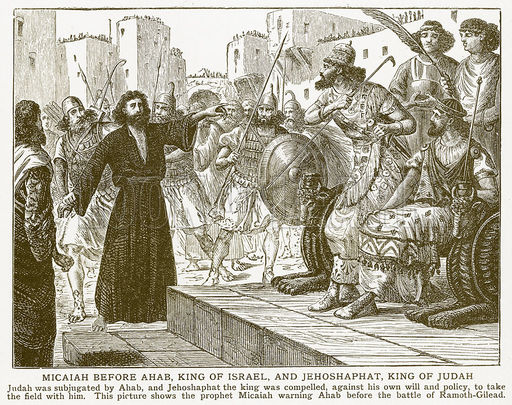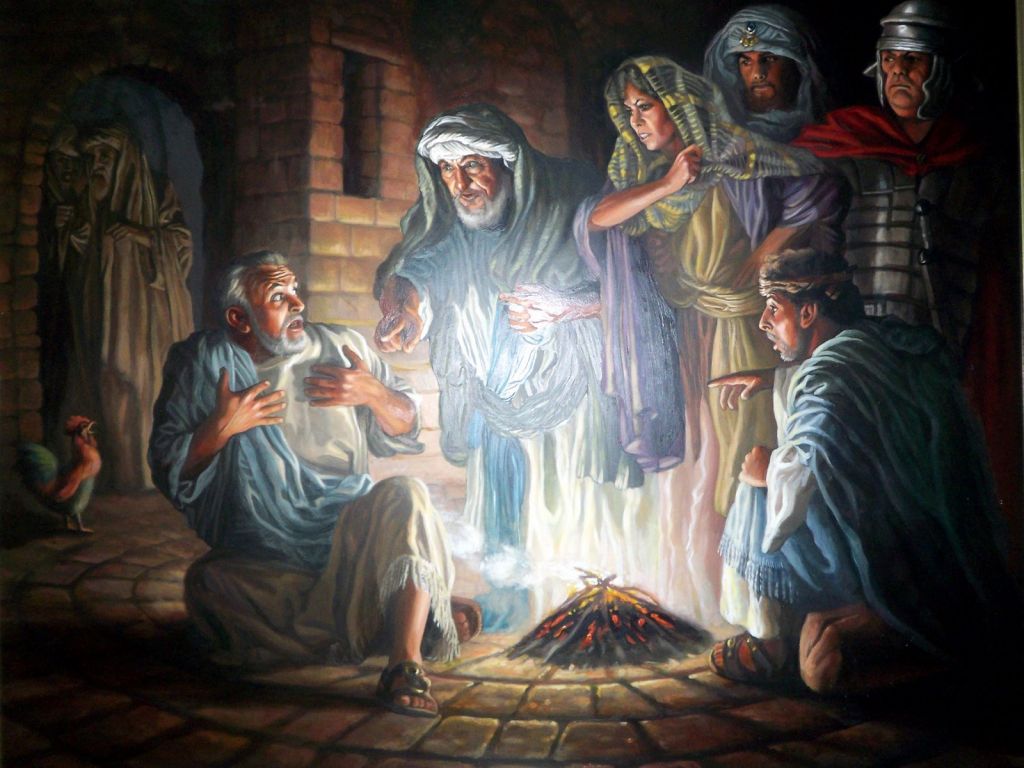
Do not believe every spirit, but test the spirits to see whether they are from God, for many false prophets have gone out into the world.

Long ago, kings often sought counsel from prophets before going to war.
Thus when evil King Ahab wanted to fight against his enemy, he summoned his 400-strong band of prophets. He asked them, “Shall I go to war against Ramoth Gilead, or shall I refrain?”
Being ‘yes men’, who would tell the king only what he wanted to hear, they answered, “Go, for the Lord will give it into the king’s hand”(1 Kings 22:6).
However, King Jehoshaphat, Ahab’s ally, was not satisfied with this chorus of approval. So Jehoshaphat asked, “Is there no longer a prophet of the Lord here whom we can inquire of (1 Kings 22:7)?”
Ahab answered, “There is still one prophet through whom we can inquire of the Lord, but I hate him because he never prophesies anything good about me, but always bad. He is Micaiah son of Imlah” (1 Kings 22:8).
However, pushed to a corner by his ally, Ahab relented and called for the voice of this remaining unpopular prophet to be heard.

Meanwhile, as if to inject colour and drama to a tense situation, Zedekiah, chief spokesman for the band of willing-to-please prophets, made iron horns and declared, “This is what the Lord says: ‘With these you will gore the enemy until they are destroyed’” (1 Kings 22:11).
Before coming into the presence of the two kings, Micaiah had already been instructed to sugar coat his prophecy so that it might flow in unison with the rest of the prophets. The messenger sent to summon Micaiah said to him, “Look, the other prophets without exception are predicting success for the king. Let your word agree with theirs, and speak favourably” (1 Kings 22:13).
Summoned before Ahab, Micaiah gave this word for the king: “Attack and be victorious for the Lord will give it into the king’s hand.” He must have said this in a tongue-in-cheek manner, knowing that the king only wanted to hear pleasant and favourable messages.
Pressed further by Ahab to reveal the truth, Micaiah painted a sombre picture of defeat should the king venture into battle: “I saw all Israel scattered on the hills like sheep without a shepherd, and the Lord said, ‘These people have no master. Let each one go home in peace’” (1 Kings 22:17). This was the blunt, bitter and unadulterated truth which Ahab was unprepared to receive.
Micaiah also provided the king a rare glimpse into a “conference” that was happening in God’s throne. When God asked who will entice Ahab to attack his enemy, a spirit of deception stepped forward and volunteered to do the dirty job. This evil spirit would worm its way through the 400 lying prophets (1 Kings 22:19-23). This incident reminds me of the discussion in heaven between God and satan when the latter wanted to test Job’s faith by bringing trials upon him.

True to Micaiah’s prophecy, Ahab’s army was defeated. Though Ahab tried to disguise himself, he was struck by a stray arrow that went through a gap in his armour. His human stratagem could not thwart the fulfillment of the prophetic word of Micaiah, which found its mark as accurately as the arrow that impaled Ahab.
Ahab suffered a most ignominious death. He was buried in Samaria, a foreign land, without honour. And they washed his chariot by the pool of Samaria, and the dogs licked up his blood, and the prostitutes washed themselves in it, according to the prophetic word of Elijah (1 Kings 21:19, 22:38).
A point of interest here is that King Jehoshaphat of Judah was a good king. He consulted God’s prophet when invading armies confronted him; as a result, he scored a tremendous victory over his enemies (2 Chronicles chapter 20).
Yet, in this instance, as an ally of Ahab, Jehoshaphat did not influence Ahab in his decision-making. He made no attempt to tell Ahab to listen to Micaiah, God’s prophet, or stop him from following the resounding voice of the majority—the false prophets—which finally lead to his (Ahab’s) doom.
The prophecies of God’s prophets, Micaiah and Elijah, came to pass in the life of evil King Ahab. The 400 false prophets who were always willing to please Ahab were put to shame.
What can we learn from the foregoing?
We must be discerning—know how to distinguish truth from falsehood. “Believe in the Lord your God, and you shall be established; believe His prophets, and you shall prosper” (2 Chronicles 20:20).
We must know how to listen to God’s voice. It may be the voice of a diminutive unpopular prophet—without the flourish or charisma of the likes of Zedekiah, chief spokesman for the band of willing-to-please prophets.
Falsehood is often enticing and pleasant—what we would like to hear—as opposed to truth which may be bitter and unpalatable.

When it comes to truth, the majority is not necessarily right. Truth does not need the endorsement of the majority.
One prophet and God make a majority—whether the prophet is Micaiah against the 400 false prophets in this account or Elijah against the 450 prophets of Baal at Mount Carmel.
The false prophets here were being deceived first (a lying spirit entered them) before they went out to deceive others. Evildoers and impostors will go from bad to worse, deceiving and being deceived (2 Timothy 3:13).
Of the various features—deception, persecution and * turbulent times—mentioned by Jesus in Matthew 24 (The Olivet Discourse) as characteristic of the end times, deception seems to be most prominent. And even the elect—supposedly mature leaders—can be deceived. If leaders are deceived, don’t you think the flock will fare even worse?
* Note: turbulent times—wars, rumours of wars, famines, pestilences, and earthquakes
“For many will come in my name, claiming, ‘I am the Messiah,’ and will deceive many” (Matthew 24:5).
“For false messiahs and false prophets will appear and perform great signs and wonders to deceive, if possible, even the elect” (Matthew 24:24).
We should not be like Jehoshaphat, who did not warn Ahab of the tragic consequences of listening to false prophets.
We need to be alert against deception. “Beloved, do not believe every spirit, but test the spirits to see whether they are from God, for many false prophets have gone out into the world” (1 John 4:1).
Only a proper understanding of scripture and discernment will enable believers to overcome deception.
“Faith is good only when it engages truth; when it is made to rest upon falsehood it can and often does lead to eternal tragedy.” – A. W. Tozer
RELATED POSTS
Be aware, be warned. It’s already here.
Are the supernatural manifestations in church today invariably of divine origin?
As long as you know God is for you, it doesn’t matter who is against you.
Some people only want to hear things that are pleasant and soothing. Anything that brings pain is rejected. They would rather listen to comforting lies than harsh truths.
HOW TO QUICKLY ACCESS PORRIDGE
For a quick overview:
To access similar articles in Christiantymalaysia.com:
http://christianitymalaysia.com/wp/?s=porridge
To access similar articles in Asian Beacon magazine:
http://asianbeacon.org/?s=Lim+Poh+Ann
Source of Article: http://limpohann.blogspot.com/2014/03/false-and-true-prophecy.html
NOTE: All pictures from original blogsite unless otherwise specified.
ABOUT Author: Dr Lim Poh Ann is a medical practitioner. He was the former editor of Asian Beacon magazine (December 2008 – October 2011). He can be reached at his blog, Porridge for the Soul
|Share The Good News|




Leave a Reply